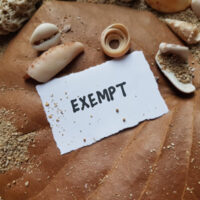Which Assets Are Exempt From Probate?

After a person dies, his or her estate goes through probate, where the court reads the deceased person’s will, and the personal representative of the estate files a final tax return for the decedent and settles the decedent’s outstanding debts. The simplest definition of an estate is a deceased person’s property, but actually, some assets do not become part of the estate. Instead, these assets are exempt from probate, so that they pass to the decedent’s heirs as soon as the heirs notify the relevant parties of the decedent’s death. Some people work diligently with their estate planning lawyers to ensure that most of their assets, the value of which adds up to millions of dollars, do not go through probate. You do not have to be wealthy for it to be worthwhile to invest in non-probate assets, and some assets that you probably already own are automatically exempt from probate. To find out more about what your heirs can inherit from you even before your estate settles, contact an Orlando estate planning lawyer.
Jointly Owned Property With Rights of Survivorship
It is an oversimplification to say that, if you jointly own property with someone, it is always exempt from probate. For example, if you are a partial owner of a business or a real estate property, your heirs inherit your share while your partners keep their shares and pass them down to their own heirs. If you and your spouse or another close family member jointly own an asset with rights of survivorship, the family member automatically becomes sole owner of the asset upon your death. Assets that can have rights of survivorship include real estate properties, bank accounts, and brokerage accounts.
Real Estate Owned as Tenancy by Entirety
Tenancy by the entirety applies only to real estate properties and only to married couples. When a couple owns their house as tenancy by entirety, it means that each spouse is 100 percent owner of the house. When one spouse dies, the surviving spouse becomes the sole owner.
Life Insurance Policies
Life insurance policies issue a payout to the designated beneficiary as soon as the policyholder’s surviving relatives present the policyholder’s death certificate to the insurance company. The payout goes directly to the beneficiary and does not become part of the policyholder’s estate.
Transfer on Death or Payable on Death Accounts
You can list a family member as a transfer on death (TOD) beneficiary on a bank account or as a payable on death (POD) beneficiary on an investment account. Accounts with TOD and POD beneficiaries are non-probate assets.
Trusts and Their Assets
Trusts are legally separate from their grantors as soon as the grantor signs the trust instrument and transfers property to the trust. Not only do they not go through probate, but they can begin paying money to the beneficiaries even while the grantor is alive.
Contact Gierach and Gierach About Keeping Assets Out of Probate
An estate planning lawyer can help you provide for your heirs through non-probate assets. Contact Gierach and Gierach, P.A. in Orlando, Florida to discuss your case.
Source:
msn.com/en-us/money/personalfinance/if-you-want-to-help-your-kids-bypass-probate-when-you-die-here-are-5-assets-to-avoid-putting-in-a-living-trust/ar-AA1wqbTi?ocid=msedgntp&pc=ACTS&cvid=14767593a05d4dd2a54be39c97942c72&ei=21
